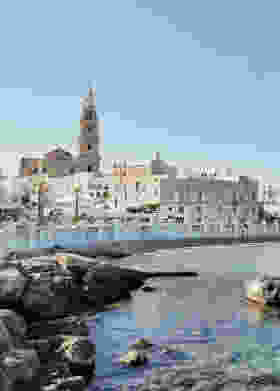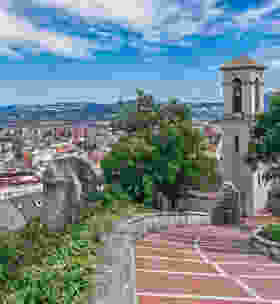Overview

The city of Foggia, with a population of approximately 151,246 residents, is located in the Apulia region of southern Italy.
Foggia is a vibrant city known for its agricultural heritage and picturesque landscapes.
Surrounded by vast plains, olive groves, and vineyards, Foggia offers a serene and idyllic setting.
The city boasts historical treasures such as the Romanesque-style Foggia Cathedral and the impressive Arco di Federico II.
Foggia is also a gateway to the beautiful Gargano National Park, renowned for its stunning coastline, charming villages, and lush forests.
Visitors can savor the authentic flavors of Apulian cuisine, including delicious pasta dishes and fresh seafood specialties.
The larger Foggia metropolitan area comprises 61 towns (comuni) and covers an area of 700.754 km2.
The population density is 89 inhabitants per km2, making it sparcely populated.
The male to female ratio is 1.00:1.05.
Foggia is a city in Apulia (Puglia) in Italy.
Search for:
Climate
The province of Foggia receives on average 243 hours of sunshine per month, or 8.1 hours of sunshine per day.NaN This is 2.97% more than the average for Italy and 3.19% less than the average for the region of Apulia.Throughout the year, it rains on average 6.98 days per month, which is below average for an Italian province.
During the autumn and winter season, there are usually 3.12 days per month with fog and 0.73 cold days per month with perceived temperatures below 3°C.
In the summer, there are on average 24.18 hot days per month with perceived temperatures above 30°C.
Weather Now
name Region.NameCost of Living
The average monthly income in Foggia is around 1221.44€, which is lower than the average for Italy.The estimated cost of living is around 1220.42€ per month for an individual or 1831.81€ per month for a family of 4.
The cost for renting a small apartment (2-3 bedrooms) in a main city area is around 722.31€ per month.
Overall, Foggia is affordable compared to other Italian provinces.
Living in Foggia is around 26.04% cheaper than the average of all Italian provinces.
Quality of Life
Healthcare
Healthcare in Foggia is above average. For every 10k inhabitants, there are around undefined pharmacies, 9.18 general practitioners and 30.8 specialized doctors per 10k inhabitants.NaNAverage life expectancy in Foggia is 81 years of age.
Education
Foggia has a lower-than-average percentage of high school graduates, around 46.4%; and a lower-than-average percentage of university graduates, around 22.2%.NaN The average number of completed years of schooling for people over 25 is 9.5, which is lower than the national average of 10.44.NaN There is one university in the province.
Leisure
Foggia may be a smaller city, but it offers a vibrant and lively nightlife scene that caters to locals and visitors.The city features a selection of bars, pubs, and clubs where people can enjoy live music, dance, and socialize.
Foggia's nightlife scene showcases a mix of traditional and contemporary venues, providing a charming and intimate atmosphere for a night out.
Overall, Foggia has somewhat decent nightlife with 2.47 bars and 3.44 restaurants per 10k inhabitants.
Crime and Safety
The province of Foggia is overall less safe than other Italian provinces for expats.As of 2021, there are an average of 3758.2 reported crimes per 100k inhabitants.
This is 32.53% higher than the national average.
There have been around 0.9 deadly road accidents and 12.6 serious work-related injuries per 10k people in Foggia.
This is respectively 66.67% more driving accidents than average and 2.33% less work accidents than average.
Car theft is reportedly 550.82% higher than average with 459.02 cases per 100k inhabitants.
NaNReports of house thefts are 18.70% lower than average with 142.3 cases per 100k inhabitants.
NaNCases of robbery are not totally uncommon, around 81.03% higher than average with 40.08 reports per 100k inhabitants.
Foggia has a relatively high crime rate compared to other cities in Italy, and caution is advised when visiting.
According to reports, crime in Foggia has been increasing over the past few years.
Visitors are strongly discouraged from walking at night and should take extra precautions to safeguard their belongings.
The risk of robbery and theft is significant, and leaving valuables unattended in cars is not recommended.
It is advisable to consult local advice and exercise vigilance when exploring the city.
Transport
Public transport in Foggia is quite good, and traffic is below average.NaNThere are on average 0.6 active vehicles per person, against a national average of 0.66.
Around 0.75km per 10k inhabitants of the main city in Foggia consist of bicycle lanes.
This makes Foggia somewhat bike-friendly by Italian standards.
Discover
Recommended Tours in Puglia
Provinces Nearby



